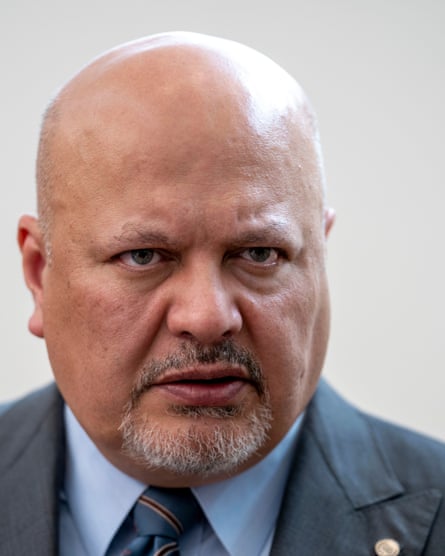The international criminal court’s decision to issue arrest warrants for Israeli leaders over the war in Gaza has been welcomed by Palestinians as a landmark moment in their decade-long fight to challenge the Israeli occupation through international institutions.
Thursday’s announcement from the international criminal court’s pretrial chamber of arrest warrants for Israel’s prime minister, Benjamin Netanyahu, and his former defence minister, Yoav Gallant, has sent shockwaves through the international legal system. As the first time that officials from a democratic, western-allied state have been charged with war crimes, it is widely seen as the most significant action taken by the court since it was set up at the turn of the century.
“We had no illusions about how tough this road was going to be. Every step leading to this moment was difficult, but Palestine stayed the course,” said Ammar Hijazi, who leads the Palestinian Authority’s delegation to The Hague, the seat of the ICC. “We told the world justice for Palestine will be the litmus test of the international system; we were not being hyperbolic.”
Diana Buttu, a human rights lawyer and former Palestinian peace negotiator, said: “The days ahead for Palestine are not good … At the same time, Israel will struggle to remove the stain of these warrants. When countries like Canada and the Netherlands say they will implement the court’s decision, it calls weapons sales and the level of political support for Israel into question.”
The ICC’s chief prosecutor, Karim Khan, announced in May his office would seek arrest warrants for the two Israelis, as well as Hamas leaders Ismail Haniyeh, Yahya Sinwar and Mohammed Deif, for war crimes and crimes against humanity.
Haniyeh and Sinwar have since been killed. The ICC also issued an arrest warrant for Deif, who is believed to have died in an Israeli airstrike in Gaza in July, although Hamas has not officially confirmed his death.
In an extraordinary rebuke of Israel’s treatment of Palestinians and its conduct in the war in Gaza, the chamber ruled there were reasonable grounds to believe Netanyahu and Gallant bore criminal responsibility as co-perpetrators for “the war crime of starvation as a method of warfare and the crimes against humanity of murder, persecution, and other inhumane acts”.

The warrants severely curtail the Israeli officials’ ability to travel abroad, since the ICC’s 124 member states would be obliged to arrest them, further deepening the country’s growing international isolation.
The move presents fresh challenges for Israel’s western allies, which are struggling to reconcile support for the Jewish state with evidence of war crimes in the conflict and respect for the rules-based order.
Member states of the ICC now have a choice between “international law and accountability for all or none at all”, Hijazi said. “They can’t pretend that the system has relevance and works if they give Israel a free pass. If states that have declared their compliance with and respect for the court match their words with actions, Israel will feel the impact on many fronts.”
Israel is not a member of the ICC and denies committing war crimes in the war in Gaza sparked by Hamas’s attack on Israel in October 2023. Many in Israel have long maintained that the UN and associated bodies such as the ICC are biased against it.
Palestine was recognised as a member of the court in 2015. The Guardian revealed in May how Israel ran a nine-year-long secret “war” against the court, deploying its intelligence agencies to surveil, hack, smear and allegedly threaten senior ICC staff in an effort to derail the court’s inquiries.
Earlier this year, after the court’s chief prosecutor applied for arrest warrants, Palestinian civil society hoped the growing threat of prosecution might have had a deterrent effect on Israel’s actions.
after newsletter promotion
Instead, the country reacted by announcing new settlements in the occupied West Bank, which were described as a punitive measure for Palestinian cooperation with the court.
Israel also stepped up its military campaign on Rafah, the southernmost town in the Gaza Strip, which at that point was the last place of relative safety for civilians in the Palestinian territory.
“Palestinian civil society has been working towards this moment since 2009; the fact that it has taken this long is an indictment of the international system. Eight thousand people have died in Gaza since [warrants were sought]. Maybe those lives could have been saved,” Buttu said.
The US president-elect, Donald Trump, is expected to impose renewed sanctions on the ICC in support of Israel, and is even less likely than Joe Biden to exert any kind of pressure on its ally to end the occupation or return to peace talks. The US, like Israel, is not a member of the court.
“If Trump has an agenda to potentially upend international politics and diplomacy as we know it, defending the international order from such a threat is an international and collective responsibility; understanding that throwing Palestine under the bus will not achieve that is critical,” Hijazi said.
Buttu added: “We are going to pay a very heavy price for Trump being elected. But I hope the ICC decision means Netanyahu will also pay a heavy price for his actions.”
This post was originally published on this site be sure to check out more of their content.








